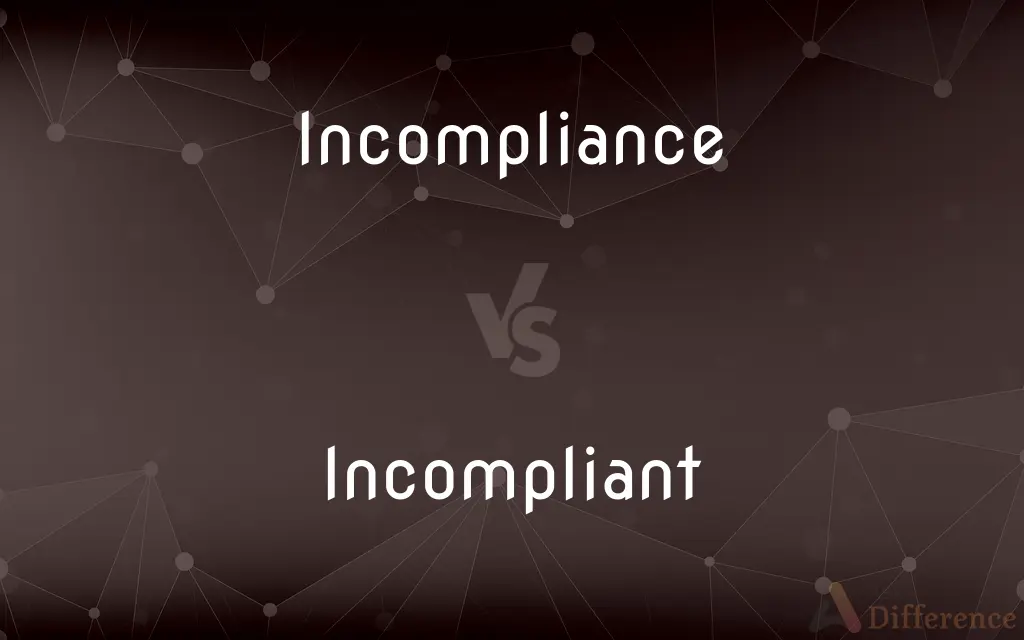Incompliance vs. Incompliant — What's the Difference?
By Tayyaba Rehman — Updated on October 30, 2023
"Incompliance" is a noun referring to the act of not adhering to rules or standards, while "Incompliant" is an adjective describing someone or something that doesn't comply or conform.

Difference Between Incompliance and Incompliant
Table of Contents
ADVERTISEMENT
Key Differences
Incompliance and Incompliant, though closely related in meaning, serve different grammatical functions. Incompliance stands as a noun that encapsulates the act or state of not adhering to a demand or standard. Conversely, Incompliant operates as an adjective, characterizing a person or entity that exhibits nonconformity or refusal to comply.
Delving deeper, Incompliance reflects an abstract notion, a circumstance or condition wherein rules, regulations, or expectations are not met. Incompliant, on the other hand, directly attaches to a subject, attributing a quality of non-adherence.
For instance, a company might face penalties due to its Incompliance with environmental regulations. In the same breath, one could say the company is Incompliant with said regulations.
The essence of these terms anchors in the realm of non-conformity, with Incompliance signifying the act or state itself and Incompliant capturing the characteristic of such non-conformity.
When selecting between Incompliance and Incompliant, it's crucial to discern if you're addressing an act (choose Incompliance) or describing a subject's attributes (opt for Incompliant).
ADVERTISEMENT
Comparison Chart
Grammatical Function
Noun
Adjective
Definition
Act or state of not adhering
Describes non-adherence
Usage in a Sentence
A situation or condition
Directly characterizes a subject
Relates to
The non-conformity itself
The entity not conforming
Example
The company's incompliance led to penalties.
The incompliant company faced penalties.
Compare with Definitions
Incompliance
State of being out of alignment with requirements.
The organization faced scrutiny due to its incompliance with ethical guidelines.
Incompliant
Acting against expected norms.
His incompliant approach often caused conflicts.
Incompliance
Non-adherence to regulations.
The firm's incompliance resulted in a lawsuit.
Incompliant
Being out of alignment with requirements.
The product is incompliant with international safety protocols.
Incompliance
Act of not abiding by rules.
The athlete's incompliance with the doping rules led to his disqualification.
Incompliant
Refusing to abide by regulations.
The incompliant vendor faced severe penalties.
Incompliance
Failure to conform to standards.
The device's incompliance with safety standards was concerning.
Incompliant
Displaying non-conformity to rules.
The incompliant behaviors were quickly addressed by the supervisor.
Incompliance
Refusal to meet expectations.
The software's incompliance with user demands made it less popular.
Incompliant
Not adhering to established standards.
The incompliant machinery was recalled.
Incompliance
Not willing to comply.
Incompliant
Not willing to comply.
Incompliance
The condition of being incompliant; a refusal to comply.
Incompliant
Not compliant.
Incompliance
The quality or state of being incompliant; unyielding temper; obstinacy.
Self-conceit produces peevishness and incompliance of humor in things lawful and indifferent.
Incompliant
Not compliant; unyielding to request, solicitation, or command; stubborn.
Incompliance
Refusal or failure to comply.
Common Curiosities
Are "Incompliance" and "Incompliant" synonyms?
They convey related ideas, but "Incompliance" is a noun, while "Incompliant" is an adjective.
Can I use "Incompliance" to describe a person?
No, it describes a state or act. Use "Incompliant" for persons.
Is "Incompliant" used to criticize?
It describes non-adherence, which can be neutral or negative based on context.
Are they formal words?
Yes, they are often used in formal or regulatory contexts.
Is "Incompliance" always negative?
Generally, it denotes failure to adhere, which is often negative but depends on context.
Which term is more commonly used?
Both are less common than "non-compliance" or "non-compliant," but their usage depends on context.
Can I say "Incompliance behavior"?
It's more appropriate to say "Incompliant behavior."
Are there other related terms?
"Non-compliance" and "Non-compliant" are more commonly used equivalents.
Can "Incompliant" be used in casual conversation?
It can, but it's more common in formal settings.
Can an object be described as "Incompliant"?
Yes, like a machine not meeting safety standards.
How do I use "Incompliance" in a sentence?
It can be the subject or object, e.g., "Incompliance with rules is evident."
Do these terms have opposites?
Yes, "Compliance" and "Compliant" respectively.
Are these words specific to any industry?
No, they can be used across various industries or contexts.
How do "Incompliance" and "Incompliant" relate to disobedience?
Both signify a form of disobedience, especially in structured settings.
Share Your Discovery

Previous Comparison
Pal vs. Friend
Next Comparison
Admire vs. IdolizeAuthor Spotlight
Written by
Tayyaba RehmanTayyaba Rehman is a distinguished writer, currently serving as a primary contributor to askdifference.com. As a researcher in semantics and etymology, Tayyaba's passion for the complexity of languages and their distinctions has found a perfect home on the platform. Tayyaba delves into the intricacies of language, distinguishing between commonly confused words and phrases, thereby providing clarity for readers worldwide.














































